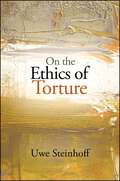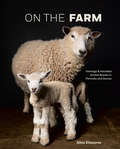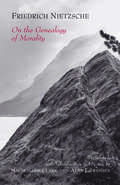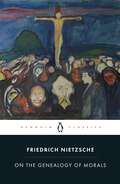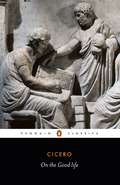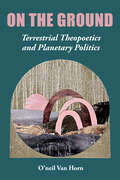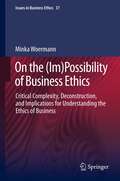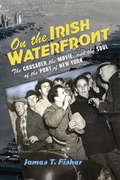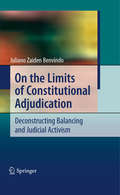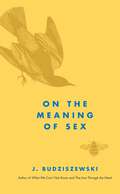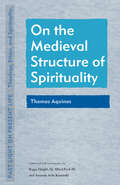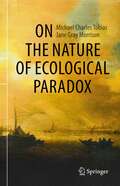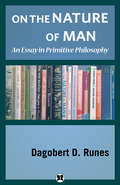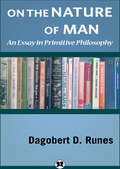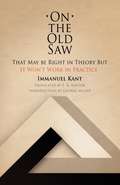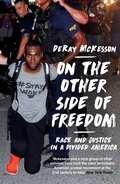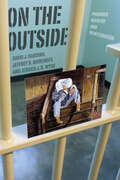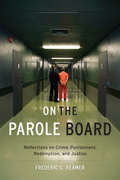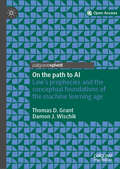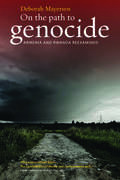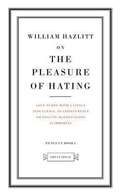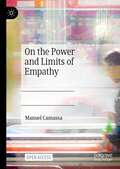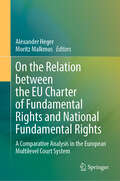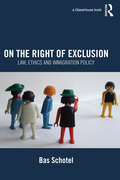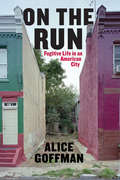- Table View
- List View
On the Ethics of Torture
by Uwe SteinhoffThe question of when, and under what circumstances, the practice of torture might be justified has received a great deal of attention in the last decade in both academia and in the popular media. Many of these discussions are, however, one-sided with other perspectives either ignored or quickly dismissed with minimal argument. In On the Ethics of Torture, Uwe Steinhoff provides a complete account of the philosophical debate surrounding this highly contentious subject. Steinhoff's position is that torture is sometimes, under certain narrowly circumscribed conditions, justified, basing his argument on the right to self-defense. His position differs from that of other authors who, using other philosophical justifications, would permit torture under a wider set of conditions. After having given the reader a thorough account of the main arguments for permitting torture under certain circumstances, Steinhoff explains and addresses the many objections that have been raised to employing torture under any circumstances. This is an indispensible work for anyone interested in one of the most controversial subjects of our times.
On the Farm: Heritage and Heralded Animal Breeds in Portraits and Stories
by Aliza EliazarovA collection of moving and soulful portraits of beloved farm animals, alongside surprising facts, entertaining anecdotes, and captivating histories of these heritage breeds on American farms.&“The beauty and breadth of heritage animal breeds is on full display in this delightful and gorgeous book.&”—Isabella Rossellini, actress and author of My Chickens and IAnimal lovers, homesteaders, eco-conscious consumers, and fans of beautiful photography alike will cherish the charm of On the Farm&’s stunning portraits and stories. With over 150 photographs, renowned animal photographer Aliza Eliazarov invites us to take a closer look at the animal breeds taking center stage in the regenerative farming movement. Along with fun facts about the domesticated animals who have shaped and changed our world—goats, sheep, cows, horses, donkeys, llamas, alpacas, pigs, chickens, turkeys, ducks, geese, and farm dogs—On the Farm features sometimes quirky, sometimes harrowing personal tales of amazing animals. Meet Bilbo, the donkey in love with truck tires; Kurt, the diminutive Angora goat with a miraculous birth story;and Princess Peppermint, an anxious pig with a taste for cocktails. The focus on rare and heritage breeds will enlighten and inform you about the astonishing variety of livestock and poultry, as well as the impact that the loss of this biodiversity is having on global food security.Equal parts fine art and field guide, shot entirely on location at small farms and homesteads, On the Farm delivers us to the pastoral with an enjoyable meditation on the animals that civilization has grown alongside.
On the Genealogy of Morality (Hackett Classics)
by Friedrich Nietzsche Alan J. Swensen Maudemarie ClarkThis new edition is the product of a collaboration between a Germanist and a philosopher who is also a Nietzsche scholar. The translation strives not only to communicate a sense of Nietzsche's style but also to convey his meaning accurately--and thus to be an important advance on previous translations of this work. A superb set of notes ensures that Clark and Swensen's Genealogy will become the new edition of choice for classroom use.
On the Genealogy of Morals
by Friedrich NietzscheThe companion book to Beyond Good and Evil, the three essays included here offer vital insights into Nietzsche's theories of morality and human psychology.Nietzsche claimed that the purpose of The Genealogy of Morals was to call attention to his previous writings. But in fact the book does much more than that, elucidating and expanding on the cryptic aphorisms of Beyond Good and Evil and signalling a return to the essay form. In these three essays, Nietzsche considers the development of ideas of 'good' and 'evil'; explores notions of guilt and bad consience; and discusses ascetic ideals and the purpose of the philosopher. Together, they form a coherent and complex discussion of morality in a work that is more accessible than some of Nietzsche's previous writings.Friedrich Nietzsche was born near Leipzig in 1844. When he was only twenty-four he was appointed to the chair of classical philology at Basel University. From 1880, however, he divorced himself from everyday life and lived mainly abroad. Works published in the 1880s include The Gay Science, Thus Spoke Zarathustra, Beyond Good and Evil, On the Genealogy of Morals, Twilight of the Idols and The Antichrist. In January 1889, Nietzsche collapsed on a street in Turin and was subsequently institutionalized, spending the rest of his life in a condition of mental and physical paralysis. Works published after his death in 1900 include Will to Power, based on his notebooks, and Ecce Homo, his autobiography.Michael A. Scarpitti is an independent scholar of philosophy whose principal interests include English and German thought of the eighteenth and nineteenth centuries, as well as exegesis and translation theory.Robert C. Holub is currently Ohio Eminent Scholar and Professor of German at the Ohio State University. Among his published works are monographs on Heinrich Heine, German realism, Friedrich Nietzsche, literary and aesthetic theory, and Jürgen Habermas.
On the Good Life
by CiceroFor the great Roman orator and statesman Cicero, 'the good life' was at once a life of contentment and one of moral virtue - and the two were inescapably intertwined. This volume brings together a wide range of his reflections upon the importance of moral integrity in the search for happiness. In essays that are articulate, meditative and inspirational, Cicero presents his views upon the significance of friendship and duty to state and family, and outlines a clear system of practical ethics that is at once simple and universal. These works offer a timeless reflection upon the human condition, and a fascinating insight into the mind of one of the greatest thinkers of Ancient Rome.
On the Ground: Terrestrial Theopoetics and Planetary Politics
by O'neil Van HornA bold, theoretical, and pragmatic book that looks to soil as a symbol for constructive possibilities for hope and planetary political action in the Anthropocene.Climate change is here. Its ravaging effects will upend our interconnected ecosystems, and yet those effects will play out disproportionately among the planet’s nearly 8 billion human inhabitants. On the Ground explores how one might account for the many paradoxical tensions posed by the Anthropocene: tensions between planetarity and particularity, connectivity and contextuality, entanglement and exclusion. Using the philosophical and theological idea of “ground,” Van Horn argues that ground—when read as earth-ground, as soil—offers a symbol for conceiving of the effects of climate change as collective and yet located, as communal and yet differential. In so doing, he offers critical interventions on theorizations of hope and political action amid the crises of climate change.Drawing on soil science, theopoetics, feminist ethics, poststructuralism, process philosophy, and more, On the Ground asks: In the face of global climate catastrophe, how might one theorize this calamitous experience as shared and yet particular, as interconnected and yet contextual? Might there be a way to conceptualize our interconnected experiences without erasing critical constitutive differences, particularly of social and ecological location? How might these conceptual interventions catalyze pluralistic, anti-racist planetary politics amid the Anthropocene? In short, the book addresses these queries: What philosophical and theological concepts can soil create? How might soil inspire and help re-imagine forms of planetary politics in the midst of climate change? On the Ground thus roots us in a robust theoretical symbol in the hopes of producing and proliferating intersectional responses to climate change.
On the (Im)Possibility of Business Ethics: Critical Complexity, Deconstruction, and Implications for Understanding the Ethics of Business
by Minka WoermannCorporations, and the environments in which they operate, are complex, with changing multiple dimensions, and an inherent capacity to evolve qualitatively. A central premise of this study is that a postmodern reading of ethics represents an expression of, and an engagement with, the ethical complexities that define the business landscape. In particular, the deconstructive philosophy of Jacques Derrida offers a non-trivial reading of a complex notion of ethics, and thereby helps us to develop the skills necessary to critique and intervene in our practices, and to develop robust strategies for living in the absence of prescriptive ethical frameworks. Although a central premise of this study is that substantive ethical claims can only be generated within a given context, the study nevertheless presents readers with a meta-position that illustrates the type of considerations that should inform ethical reflection from a complexity perspective. In order to illustrate the value that this meta-position holds for business ethics, these considerations are explored in terms of the implications that they hold for our understanding of corporate social responsibility, for the practice of responsible management and leadership practices, and for teaching business ethics.
On the Irish Waterfront: The Crusader, the Movie, and the Soul of the Port of New York
by James T. FisherSite of the world's busiest and most lucrative harbor throughout the first half of the twentieth century, the Port of New York was also the historic preserve of Irish American gangsters, politicians, longshoremen's union leaders, and powerful Roman Catholic pastors. This is the demimonde depicted to stunning effect in Elia Kazan's On the Waterfront (1954) and into which James T. Fisher takes readers in this remarkable and engaging historical account of the classic film's backstory. Fisher introduces readers to the real Father Pete Barry featured in On the Waterfront, John M. Pete Corridan, a crusading priest committed to winning union democracy and social justice for the port's dockworkers and their families. A Jesuit labor school instructor, not a parish priest, Corridan was on but not of Manhattan's West Side Irish waterfront. His ferocious advocacy was resisted by the very men he sought to rescue from the violence and criminality that rendered the port a jungle, an outlaw frontier, in the words of investigative reporter Malcolm Johnson. Driven off the waterfront, Corridan forged creative and spiritual alliances with men like Johnson and Budd Schulberg, the screenwriter who worked with Corridan for five years to turn Johnson's Pulitzer Prize-winning 1948 newspaper exposé into a movie. Fisher's detailed account of the waterfront priest's central role in the film's creation challenges standard views of the film as a post facto justification for Kazan and Schulberg's testimony as ex-communists before the House Committee on Un-American Activities. On the Irish Waterfront is also a detailed social history of the New York/New Jersey waterfront, from the rise of Irish American entrepreneurs and political bosses during the World War I era to the mid-1950s, when the emergence of a revolutionary new mode of cargo-shipping signaled a radical reorganization of the port. This book explores the conflicts experienced and accommodations made by an insular Irish-Catholic community forced to adapt its economic, political, and religious lives to powerful forces of change both local and global in scope.
On the Limits of Constitutional Adjudication
by Juliano Zaiden BenvindoJuliano Z. Benvindo investigates the current movement of constitutional courts towards political activism, especially by focusing on the increasing use of the balancing method as a "rational" justification for this process. From the critical perception of the serious risks of this movement to democracy, the book takes as examples two constitutional realities, Germany and Brazil, in order to discuss the rationality, correctness, and legitimacy of constitutional decisions within this context. Through a dialogue between Jacques Derrida's deconstruction and Jürgen Habermas's proceduralism, the author confronts Robert Alexy's defense of the balancing method as well as those two constitutional realities. This confrontation leads to the introduction of the concept of limited rationality applied to constitutional democracy and constitutional adjudication, which affirms the double bind of history and justice as a condition for a practice of decision-making committed to the principle of separation of powers.
On the Meaning of Sex
by J. BudziszewskiOur society is obsessed with sex - and yet we don't understand it at all. Acclaimed philosopher J. Budziszewski remedies the problem in this wise, gracefully written book about the nature, meaning, and mysteries of sexuality. On the Meaning of Sex corrects the most prevalent errors about sex - particularly those of the sexual revolution, which by mistaking pleasure for a good in itself has caused untold pain and suffering.
On the Medieval Structure of Spirituality: Thomas Aquinas (Past Light on Present Life: Theology, Ethics, and Spirituality)
by HaightIf Thomas Aquinas was born in 1225, as is commonly thought, then he died before reaching the age of fifty after producing the single most influential systematic theology of the Western Christian tradition. He did this with a formula: He internalized the thought of Aristotle as it was being introduced into western Europe and translated into Latin, and he in turn “translated” Christianity into this Aristotelian language. One can use the principles of hermeneutics outlined in Retrieving the Spiritual Teaching of Jesus of this series to analyze what was going on as Aquinas went through some of the basic doctrines of the Church in his Summa Theologiae. He laid out their contents by answering an exhaustive series of questions and responding to each of them in intricate detail. The model for each question and answer was drawn directly from the pattern of learning at the University of Paris. Although systematic and abstract, it also enabled an extensive conversation with the tradition of classical theologians and his own contemporaries. This may seem quite distant from spiritual life on the ground, but the method produced a clear understanding of the structure of spiritual life in terms of its goal and the means of attaining it. Aquinas’s analysis of grace—how it enabled genuine Christian spirituality, empowered the virtues, and led to eternal life—constitutes a classic substructure of Western Christian spirituality that became all the more distinctive when Reformation spiritualities offered alternatives to it.
On the Nature of Ecological Paradox
by Michael Charles Tobias Jane Gray MorrisonThis work is a large, powerfully illustrated interdisciplinary natural sciences volume, the first of its kind to examine the critically important nature of ecological paradox, through an abundance of lenses: the biological sciences, taxonomy, archaeology, geopolitical history, comparative ethics, literature, philosophy, the history of science, human geography, population ecology, epistemology, anthropology, demographics, and futurism. The ecological paradox suggests that the human biological–and from an insular perspective, successful–struggle to exist has come at the price of isolating H. sapiens from life-sustaining ecosystem services, and far too much of the biodiversity with which we find ourselves at crisis-level odds. It is a paradox dating back thousands of years, implicating millennia of human machinations that have been utterly ruinous to biological baselines. Those metrics are examined from numerous multidisciplinary approaches in this thoroughly original work, which aids readers, particularly natural history students, who aspire to grasp the far-reaching dimensions of the Anthropocene, as it affects every facet of human experience, past, present and future, and the rest of planetary sentience.With a Preface by Dr. Gerald Wayne Clough, former Secretary of the Smithsonian Institution and President Emeritus of the Georgia Institute of Technology. Foreword by Robert Gillespie, President of the non-profit, Population Communication.
On the Nature of Man
by Dagobert D. RunesThis insightful work, from the pen of the well-known philosopher, is offered as an attempt to define the borderlines of human thinking and human morality. Dr. Runes, in his search for verities and true humanity, takes the reader on an arduous voyage through the depths of the mind. This type of soul-searching philosophy, unburdened by traditional manner and terminology, is sometimes baffling, frequently of melancholy character, but almost always fascinating and inspiring.
On the Nature of Man: An Essay in Primitive Philosophy
by Dagobert D. RunesThis work of philosophical soul-searching explores the mysteries of human life and consciousness.In this fascinating work of spiritual philosophy, Dagobert D. Runes sets out on a contemplative journey unencumbered by the traditional manner and terminology of philosophical writing. His purpose here is to articulate the true essence of humanity and human thought. By turns inspiring and melancholy, Runes peels back the layers of quotidian life to explore its deepest meaning. As Runes puts it in this volume: &“What goes on in the core of our mind, this tumult created of our vexation with the business of animal living, lies just in our mind. Our mind is our whole world; the whole world is in our mind.&”
On the Old Saw
by George Miller Immanuel Kant E. B. AshtonIn this famous essay, first published in 1793, Kant considers the alleged conflict between theory and practice in the conduct of human affairs in three widening contexts: those of the common person faced with a moral decision, of the politician and the citizen concerned with the extent and limits of political obligation, and, finally, of the citizen of the world whose actions have a bearing on war and peace among nations.Unlike other animals, Kant reminds us, people must decide how they will live their lives. They therefore ask for a guide to action, a set of principles--a theory.From the outset, Kant rejects the ancient claim that the practical possibilities of action cannot always be reconciled with moral demands. He offers his own moral theory, a theory starting out from the principle of the right as an unequivocal guide to action. In partial disagreement with the rival theories of Hobbes and Locke, he proposes that the only condition under which the individual can achieve true destiny as a person and a member of the human race is the civil state. Such a state can be secured only by law. Although "from such crooked wood as man is made of, nothing perfectly straight can be built," only the rule of law can bring about a stable society.Last, Kant turns to the relation between theory and practice in international relations. "Nowhere," he writes, "does human nature appear less lovable than in the relation of whole nations to each other." But to hope for world peace on the basis of "the so-called balance of power is a mere chimera." There is no other remedy to international lawlessness and war than an international coercive law, and such law can grow only out of sound theory. "I put my trust in theory. At the same time, I trust in the nature of things, and also take account of human nature, which I cannot, or will not, consider so steeped in evil that in the end reason should not triumph."
On the Other Side of Freedom: Race and Justice in a Divided America
by DeRay MckessonFive years ago, DeRay Mckesson quit his job as a schoolteacher, moved to Ferguson, Missouri, and spent the next 400 days on the streets as an activist, helping to bring the Black Lives Matter movement into being. Now, in his first book, he draws on his own experiences – of growing up without his mother, with a father in recovery, of having a house burn down and a bully chase him home from school, of pacifying a traffic cop at gunpoint and being dragged out of a police station by his ankles, of determined activism on the streets and in the White House – to make the case for hope, for believing a better future is possible. It is a visionary&’s call to take responsibility for imagining, and then building, the world we want to live in.
On the Outside: Prisoner Reentry and Reintegration
by David J. Harding Jeffrey D. Morenoff Jessica J. Wyse“A crucial analysis of how the truly disadvantaged people who enter prison fare in the three years after their release.” —Paula England, NYUAmerica’s high incarceration rates are a well-known facet of contemporary political conversations. Mentioned far less often is what happens to the nearly 700,000 former prisoners who rejoin society each year. On the Outside examines the lives of twenty-two people—varied in race and gender but united by their time in the criminal justice system—as they pass out of the prison gates and back into the world. The book takes a clear-eyed look at the challenges faced by formerly incarcerated citizens as they try to find work, housing, and stable communities. Standing alongside these individual portraits is a quantitative study conducted by the authors that followed every state prisoner in Michigan who was released on parole in 2003 (roughly 11,000 individuals) for the next seven years, providing a comprehensive view of their post-prison neighborhoods, families, employment, and contact with the parole system. On the Outside delivers a powerful combination of hard data and personal narrative that shows why our country continues to struggle with the social and economic reintegration of the formerly incarcerated.One of the Vera Institute of Justice’s Best Criminal Justice Books of 2019
On the Parole Board: Reflections on Crime, Punishment, Redemption, and Justice
by Frederic G. ReamerFew people experience life inside of prison. Even fewer are charged with the formidable responsibility of deciding whether inmates should be released. In his twenty-four years on the Rhode Island Parole Board, Frederic G. Reamer has judged the fates of thousands of inmates, deciding which are ready to reenter society and which are not. It is a complicated choice that balances injury to victims and their families against an offender's capacity for transformation. With rich retellings of criminal cases—some banal, some brutal—On the Parole Board is a singular book that explains from an insider's perspective how a variety of factors play into the board's decisions: the ongoing effect on victims and their loved ones, the life histories of offenders, the circumstances of the crimes, and the powerful and often extraordinary displays of forgiveness and remorse. Pulling back the curtain on a process largely shrouded in mystery, Reamer lays bare the thorny philosophical issues of crime and justice and their staggering consequences for inmates, victims, and the public at large. Reamer and his colleagues often hope, despite encountering behavior at its worst, that criminals who have made horrible mistakes have the capacity for redemption. Yet that hope must be tempered with a realistic appraisal of risk, given the potentially grave consequences of releasing an inmate who may commit a future crime. This book will appeal to anyone interested in the complexities of the criminal justice system, the need to correct its injustices, and the challenges of those who must decide when justice has been served.
On the path to AI: Law’s prophecies and the conceptual foundations of the machine learning age
by Thomas D. Grant Damon J. WischikThis open access book explores machine learning and its impact on how we make sense of the world. It does so by bringing together two ‘revolutions’ in a surprising analogy: the revolution of machine learning, which has placed computing on the path to artificial intelligence, and the revolution in thinking about the law that was spurred by Oliver Wendell Holmes Jr in the last two decades of the 19th century. Holmes reconceived law as prophecy based on experience, prefiguring the buzzwords of the machine learning age—prediction based on datasets.On the path to AI introduces readers to the key concepts of machine learning, discusses the potential applications and limitations of predictions generated by machines using data, and informs current debates amongst scholars, lawyers and policy makers on how it should be used and regulated wisely. Technologists will also find useful lessons learned from the last 120 years of legal grappling with accountability, explainability, and biased data.
On the Path to Genocide: Armenia and Rwanda Reexamined
by Deborah MayersenWhy did the Armenian genocide erupt in Turkey in 1915, only seven years after the Armenian minority achieved civil equality for the first time in the history of the Ottoman Empire? How can we explain the Rwandan genocide occurring in 1994, after decades of relative peace and even cooperation between the Hutu majority and the Tutsi minority? Addressing the question of how the risk of genocide develops over time, On the Path to Genocide contributes to a better understand why genocide occurs when it does. It provides a comprehensive and comparative historical analysis of the factors that led to the 1915 Armenian genocide and the 1994 genocide in Rwanda, using fresh sources and perspectives that yield new insights into the history of the Armenian and Rwandan peoples. Finally, it also presents new research into constraints that inhibit genocide, and how they can be utilized to attempt the prevention of genocide in the future.
On the Pleasure of Hating
by William HazlittAppearing as part of his Table-Talk series, a conversational series written on topics concerning every day issues, William Hazlitt wrote On the Pleasure of Hating in 1823 during a bitter period of his life, amidst rising controversy over his previous works, as well as the dissolution of his marriage. Disgusted with the flowery romantic literature which was flourishing in that post-French Revolution period, Hazlitt drew inspiration from the works of Jean Jacques Rousseau, Edmund Burke, and various well-known English poets. He became known as one of the first English writers to make a profession of descriptive criticism. Fascinated with the extremes of human capabilities, Hazlitt wrote this essay as a plea for the understanding not merely of the pleasures of hating, but of the pleasures of realism. This collection includes seven essays: The Fight, The Indian Jugglers, On the Spirit of Monarchy, What is the People?, What is the People? (concluded), On Reason and Imagination, and On the Pleasure of Hating.
On the Power and Limits of Empathy
by Manuel CamassaThis book has two main objectives. The first is to identify and adequately describe the phenomenon of empathy. This essentially means offering a strong, reasoned and accurate description of the phenomenon of empathy in order to capture the essence of the empathic phenomenon and clearly distinguish it from other similar emotional phenomena such as sympathy or compassion The second part focuses on the role that this phenomenon can play on the ethical-moral level. The question is whether empathy is necessary or at least important for morality, and if so, to what extent, in what way and for what reasons. This is an open access book.
On the Relation between the EU Charter of Fundamental Rights and National Fundamental Rights: A Comparative Analysis in the European Multilevel Court System
by Alexander Heger Moritz MalkmusThe sometimes complex and controversial relation between the fundamental rights of the European Union, as enshrined in the EU Charter of Fundamental Rights (CFR), and national fundamental rights in the context of constitutional review is reflected in a series of landmark decisions in the multilateral cooperation of European courts, which have reshaped the fundamental rights architecture in the multilevel system in recent decades. This book aims to contribute to a systematic and comprehensive analysis of the EU and constitutional law issues involved, thus serving as a reference point for scholars and practitioners dealing with this emerging topic in depth. Following this approach, it sheds light on the broader Union legal context of these developments, examines the role of the CFR for Constitutional Courts, the relationship between constitutional and ordinary courts, and assesses the key decisions concerning the application of the CFR as a standard of constitutional review. It also draws some initial conclusions on the development of the European fundamental rights architecture, its prospects and possible implications for the Union’s legal order. The book contains several contributions by European legal experts from academia and the judiciary, who examine the different methods of constitutional application of the CFR from a comparative law perspective. These contributions deal with the following aspects: first, the role of the CFR for the respective Constitutional Court with regard to the application of EU law as well as national law falling within the scope of the CFR; second, the relationship between the respective Constitutional Court and the ordinary courts with regard to the application of the CFR; third, the relevant facts and legal reasoning of the most important Constitutional Court decisions on the application of the CFR as a relevant standard of constitutional review; fourth, the relevant case law of the CJEU on the relationship between Union and national fundamental rights, as well as its broader implications for the multilateral cooperation of European courts. The individual chapters examine, inter alia, the following decisions: Verfassungsgerichtshof (Austria), March 14, 2012, U 466/11 et al.; Corte Constituzionale (Italy), January 23, 2019, Sentenza 20/2019; Bundesverfassungsgericht (Germany), November 6, 2019, 1 BvR 276/17; Tribunal Constitucional (Portugal), June 3, 2022, Acórdão 268/2022; Tribunal Constitucional (Spain), June 29, 2022, Sentencia Decision 89/2022.
On the Right of Exclusion: Law, Ethics And Immigration Policy
by Bas SchotelFirst Published in 2011. Routledge is an imprint of Taylor & Francis, an informa company.
On the Run: Fugitive Life in an American City
by Alice GoffmanThis book is an on-the-ground account of the US prison boom: a close-up look at young men and women living in one poor and segregated Black community transformed by unprecedented levels of imprisonment and by the more hidden systems of policing and supervision that have accompanied them. Because the fear of capture and confinement has seeped into the basic activities of daily living--work, family, romance, friendship, and even much-needed medical care--it is an account of a community on the run.
